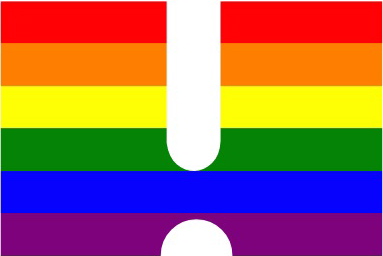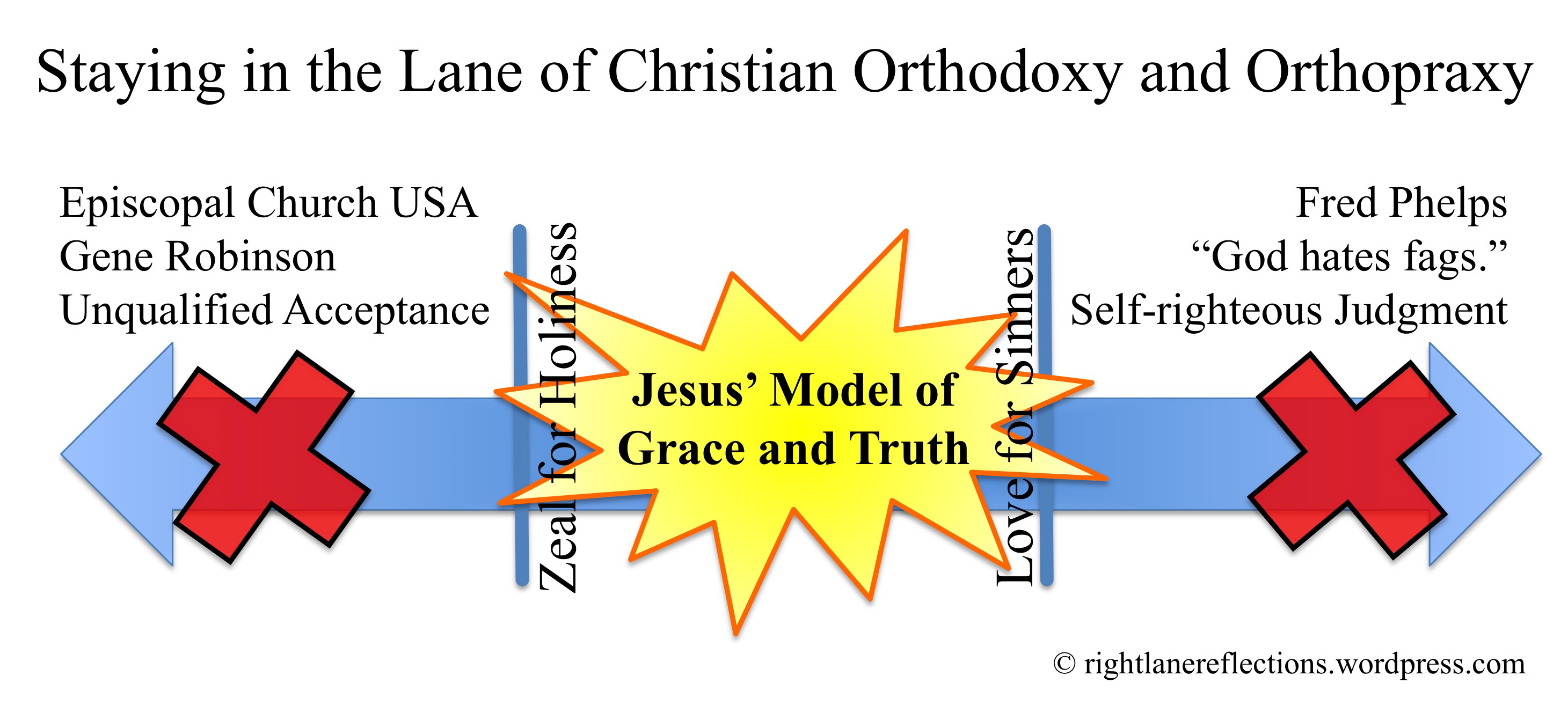Homosexuality: The Proper Christian Response

This is the second of two posts on the topic of homosexuality. The first post introduced the issue. This post outlines the proper Christian response to gay individuals.
The $10 million dollar question: “How should Christians respond to gay individuals[1] in a way that honors both them and biblical truth so that we can earn the right to be heard?
It’s a tricky question for most Christians as tire-blowing and axel-breaking potholes litter the road surface. The main reason the topic of homosexuality has become a roadblock is because the controversy forces the Christian community to wed right beliefs (orthodoxy) with right practices (orthopraxy).
For example, the far right response of Fred Phelps and the like rightly condemn the lifestyle but in practice but they misrepresent God’s gracious, loving character. The far left reaction of the Episcopal Church USA correctly reaches out to gay individuals but in the process violates long-held Christian beliefs concerning sexual purity.
So I’ve come up with two principles and an application that effectively brings these tensions together in a way that both honors gay individuals and the God Christians are to represent. The graphic below illustrates my thinking on the topic. My hope is that this post will helpfully guide the conversation in the right direction.
Principle #1: God loves the Gay Individual
The famous passage in John 3:16 begins, “For God so loved the world….” Notice that no distinction is made in whom God loves. It doesn’t say that God loved some and not others. Rather it says God loves every person who has ever lived.
The passage continues “…that he gave his one and only Son….” Notice here that love requires action. It’s more than an emotion. Thus, the demonstration of God’s love for lost sinners in Christ’s death on the cross.
Finally, this verse reveals God’s motive for sending Jesus: “…that whoever believes in him shall not perish but have eternal life.” In God’s loving-kindness towards his enemies, he extends to us the unmerited gift of redemption from sin and death in order that creation may be restored: God reunited with man.
You see, we must remember that God loves sinners, including the gay individual. Our usual tendency is to see this particular sin as being somehow worse than other sins, but in fact homosexuality is one just variety of sexual brokenness that God longs to redeem.
If that’s God’s attitude toward them and we want to represent God in our world, then should we not adopt a similar outlook? If we want to earn the right to be heard, then we must see gay individuals as God does, as broken, hurting people who are longing for affection, intimacy, and acceptance. Those are all basic human needs.
Principle #2: God Hates Idolatry
A lifestyle of sexual immorality, of which homosexuality is but one expression, is idolatry. Idolatry is an “extreme love or reverence for someone or something.” It is putting someone or something in the place of God. Thus, a lifestyle of sexual immorality – fulfilling selfish, carnal desires without respect for God’s desire for purity – is, in fact, worship of self. It is idolatry, and God hates idolatry.
Numbers 25 records an unflattering moment in Israel’s history as their years in the desert wilderness are drawing near an end. It recounts how some of the Israelite men entered into cultic prostitution with Moabite woman. This defiance against God is punctuated by one particular man who parades his sin in front of the whole Israelite community. Phinehas, filled with zeal for God’s holiness, sees what this man is about to do, follows him to his tent with a spear in hand, and kills both of them in the middle of their “worshipful experience” of Baal, thereby ending the plague that had already killed 24,000 people. Phinehas’ actions propitiated, or satisfied, God’s wrath for Israel’s sin.
The point of the passage is that prior to entering the Promised Land, Israel needed a final reminder that God hates idolatry. This episode is consistent with God’s character, who is “…slow to anger, abounding in love…. Yet he does not leave the guilty unpunished” (Num 14:18).
I’m not suggesting we do what Phinehas did. Heaven’s no! But we ought to feel what Phinehas felt when he witnesses that man’s brazen act of idolatry. Call it a righteous intolerance for egregious sin or a willingness to convey the truth that God calls people not to live for themselves, but just the opposite. He bids us to come and die that we may live (ref Matt 16:24; Gal 2:20).
Application: Employ Jesus’ Model of Grace and Truth
In John 8:1-11, the gospel writer recalls the scene where a woman caught in adultery is brought before Jesus to stand trial for her sin (though in reality Jesus is the one on trial).
Granted, the primary purpose for this story isn’t to teach us a proper response to homosexuality. Rather this episode in Jesus’ life provides a picture of how Jesus resolved this tension of right beliefs (truth) and practice (grace). It is relevant to our discussion on homosexuality because of the power of demonstration.
The religious leaders have carefully set the stage with a well-placed question: “…this woman was caught in the act of adultery. In the Law Moses commanded us to stone such women. Now what do you say?” (v. 4). If Jesus says, “Stone her,” then they will have succeeded in shaming Jesus before his growing crowd of followers. If he pardons her, then he’ll be seen as not upholding the Law. Do you see the tension? On the one side, Jesus is being pressed to carry out God’s righteous decrees. And on the other, Jesus desires to reveal God’s loving heart towards broken sinners.
Law and Love; truth and grace. How do you show both?
Of course, Jesus’ response is pure wisdom. “If any of you is without sin, let him be the first to throw a stone at her.” In a matter of moments, Jesus is alone with the woman. He alone has the right to throw the stone. But he chooses mercy over justice, grace over the grave.
Yet notice also his parting words at the end of verse eleven, “Go now and leave your life of sin.” Jesus still calls a spade a spade. He doesn’t mince words. What she did was wrong. She violated the marriage covenant, even if she was just a pawn in whole charade. So Jesus neither condemns nor condones her behavior, but in mercy he delays her judgment to a later time. He models for us mercy and truth.
In like manner, we need not judge gay individuals on God’s behalf. That’s God’s job and I’d just as soon let him tackle that task. Our job is to represent God well. This entails communicating truth with grace. It’s not either/or but both/and.
So there it is! (A bit longer than my usual post but needed to develop the argument.)
Two principles and an application. If Christians adopt this approach in their interactions with gay individuals, I believe we will make tremendous strides in earning the right to be heard. We will not change the culture necessarily, but we may be the instruments through which God changes individuals.
Like I said earlier, this is tricky stuff! I’ve tried to negotiate the subject with great care. I confess that at times I’m not entirely comfortable with the position I’ve taken.
Nevertheless, I can’t shake the idea that that’s a good thing. Jesus calls his people to embrace the tension of being in this world but not of it, which this approach strives to do.
Lord, grant your people skill in knowing when to bring grace and when to assert truth, humbly and lovingly. Amen.
Now I welcome your reflections.
- Which “camp” do you tend towards?
- Where is your greatest point of tension? Conveying grace or truth?
- How have you been challenged by reading this post?
[1] For clarity, I am defining a gay individual as someone who has fully embraced and is actively engaged in the homosexual way of life. The term here does not refer to someone struggling with his/her sexual identity.




17 Comments
Emily Nicole Yoder · June 5, 2013 at 8:01 am
Hey Brian! Great post. I completely agree with you, and you did well in simplifying this complicated and delicate issue. I think what you’ve laid out is definitely the best way to respond to gay people outside the church.
I say “outside the church” because my personal greatest point of tension lies in dealing with gay people who claim to still be Christians [theologically, I’m not sure how this works, but it’s there, so we have to deal with it], and want to play an active role in the church while openly practicing homosexuality. They can present a heck of an argument because they know all the lingo, they know how to take verses out of context, they know how to spot hypocrites in the church, and they can lob the “first stone” verse right back at anybody who tries to quote Scripture to them (while conveniently ignoring that “go and sin no more” clause there at the end of that verse). They often demand to be treated like equals in the Christian community because “my homosexuality is no more sinful in the eyes of God than your gossip, or your lust, or your pride, or your fill-in-the-blank that you are obviously still enslaved to.” Unfortunately, they have a point. And I think a lot of churches don’t know what to do with it. Fortunately, the Bible has an answer: So what if all our sins are equal in God’s eyes? “Shall we keep on sinning that grace may abound? God forbid!” We in the American church have grossly neglected our duty to keep each other accountable, which includes sometimes gently rebuking someone if we see something in their lives that is consistently not matching up with what the testimony of a Christian should be. For example, if there is a Christian who is constantly tearing people down and causing division with gossip, that person should be lovingly confronted in the same way as a “Christian” who is persisting in a lifestyle of homosexuality. In my opinion, neglecting that responsibility is what has caused the Church to lose the right to effectively address the issue of “homosexual Christians.” Our churches ARE full of hypocrites, and that’s a shame.
If someone is a gay non-Christian, I agree that you should try to love them as you would love any other non-Christian, and share the Gospel very clearly with them (without even addressing their homosexuality, if you can. You have to help them see that they would need Jesus even if they were straight). And of course, obviously pray for them…..but if they’ve been clearly presented with the Gospel, and rejected it, your responsibility to them is kinda finished. If they don’t want to be saved, there’s not a lot you can do about it. I mean, sure, keep praying like the dickens for them, and be a good friend and everything, but don’t expect to have the same level of fellowship as you will with committed Christians.
Brian · June 5, 2013 at 5:18 pm
Emily, you wrote:
“We in the American church have grossly neglected our duty to keep each other accountable, which includes sometimes gently rebuking someone if we see something in their lives that is consistently not matching up with what the testimony of a Christian should be. For example, if there is a Christian who is constantly tearing people down and causing division with gossip, that person should be lovingly confronted in the same way as a “Christian” who is persisting in a lifestyle of homosexuality. In my opinion, neglecting that responsibility is what has caused the Church to lose the right to effectively address the issue of ‘homosexual Christians’.”
Couldn’t agree more. You make an excellent point. We have tolerated all kinds of sexual immortality for a long time. This exposes another gapping wound within the church – that of church disciple. There is only one sin that ought to be disciplined, and that is the sin of an unrepentant heart. We all struggle with sins and no one should be disciplined for those sins per say. But the one sin that cannot be tolerated is when someone refuses to receive Godly correction. That standard applies across the board regardless of the particular sin. And I really like your Romans 6:1ff reference. Very appropriate passage.
Thanks for your comment and for sharing your personal tension point.
Helen F. Rehfeld · June 5, 2013 at 8:53 am
Very well put Brian. Thank you for sharing this.
Brian · June 5, 2013 at 5:18 pm
You’re very welcome, Helen. Great to hear from again and thanks for following the blog! I’m glad it was helpful.
sacredstruggler · June 5, 2013 at 1:30 pm
That’s a new one to me. I have never heard the homosexuality is idolatry argument. Very interesting. I think I need a while to think on that. Thanks for giving me something to think about. I hope you don’t mind me passing this on.
Brian · June 5, 2013 at 6:06 pm
Yeah, that statement is carefully qualified in my post. I am trying to be clear in saying that it is the lifestyle that is idolatrous. I’m also making a distinction between gay individuals who openly embrace the lifestyle versus those who struggle with their sexual identity but are seeking to submit themselves to Christ’s Lordship in their lives. The post focuses only on the former and not the later.
The move to idolatry is an important element to my argument. By design I left out all the traditional passages (Rom 1, Lev 18, Gen 19, etc) because they are lightening rods for all sorts of rebuttals and criticisms. And I generally haven’t found them helpful in advancing the discussion toward meaningful ends.
Thanks for your comment!
sacredstruggler · June 5, 2013 at 1:31 pm
Reblogged this on Sacred Struggler and commented:
Very interesting perspective. Iam not quite sure where I stand on the homosexuality as idolatry thing, but I’d love to hear my community’s thoughts on this one.
Brian · June 5, 2013 at 6:07 pm
Not a problem. Thanks for giving due credit.
Jeremy Sheffel · June 5, 2013 at 5:31 pm
@ Emily
I completely agree with you on the issue of church discipline for openly homosexual Christians. The problem is, if we are going to actually start paying attention for 1 Corinthians 5 and Matthew 18, we can’t just pick on homosexuals but have to deal with all the other sins that, in some cases, have been ignored by the church for years. The fear is that if we start confronting people with their sins, they will leave the church (which is a possibility).
@ sacredstruggler
The case of homosexuality as a direct result of idolatry is laid out by Paul in Romans 1. To sum it up: 1) God’s existence and basic nature is evidenced by creation. 2) People have rejected God as revealed in creation and substituted a god of their own making. 3) God, in judgement of their sins, turned them over to unnatural sexual behaviors.
Brian · June 5, 2013 at 6:12 pm
Great comments, Jeremy! Thanks for sharing.
Emily Nicole Yoder · June 5, 2013 at 7:50 pm
yup, that was my point, Jeremy. It’s the epitome of hypocrisy to all of the sudden decide we’re going to single out homosexuals when we’ve been conveniently letting so many sins slide in the church for decades. So, what can we do? Some churches decide that they need to apologize to gays for how badly they’re treated everywhere else, and accept them without question to show them how much God loves them. Others just keep ignoring sin within the church, but take a strong stand against homosexuality (which ultimately accomplishes absolutely nothing). Brian was right when he said that there’s really no middle ground or balance in how the church is currently responding to homosexuals.
Brian · June 5, 2013 at 8:59 pm
There are some churches/individuals that get it right, but they are the exception. For example, I’d recommend a fairly recent podcast from The Table It’s very informative and helped to shape my thinking on the subject. You’ll have to check it out: http://www.dts.edu/thetable/play/discussing-homosexuality-sexuality-together/
fencingwithink · June 7, 2013 at 7:32 am
Good stuff, trying to find the balance between the two extremes. Good graphic to use, too.
Brian · July 29, 2013 at 6:12 am
Thank you. Appreciate the feedback!
shane moore · July 29, 2013 at 1:52 am
you disgust me. there’s nothing unethical about two people loving each other. you f*****g idiots tried the same tired a** arguments with biracial relationships back in the 60’s (research loving v. virginia). if you can’t compromise your religious beliefs with the rational truth that people should be treated equally, then maybe your religious beliefs are just plain wrong.
Brian · July 29, 2013 at 6:12 am
Shane, do you believe tolerance is a virtue or vice?
LL · November 30, 2018 at 12:29 pm
Touche`